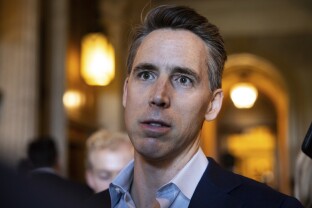Social media has been awash with disturbing videos, hateful posts and partisan politics since conservative icon Charlie Kirk was assassinated last week. Lawmakers from both parties said they’re horrified — and they’re hoping Kirk’s killing is a wakeup call to social media’s dangers.
“It’s not that there’s no room in people’s lives for social media,” Sen. Brian Schatz told NOTUS. “But it is breaking us apart civically, and sort of atomizing our communities and making us all inordinately pissed at each other.”
Last week, Utah Gov. Spencer Cox said the access people have to violent imagery on social media is “not good for us,” calling it a “cancer to our society.” The Republican said the aftermath of Kirk’s death is a “watershed” moment in American history.
Many members of Congress agree, according to interviews with NOTUS this week, although there’s no clear consensus on how lawmakers can address it, or even if they should.
Schatz told NOTUS that he doesn’t really “know if this has any political benefit to our party or another party,” but that the perils of the algorithms should be an issue for elected officials.
Republican Sen. Josh Hawley could not be more different ideologically from Schatz. But Hawley also called for a change. The longtime social media industry critic said he hopes the assassination of Kirk, whom he called a friend, will force tech companies to be accountable for the content they spread.
Hawley said Wednesday he’s “willing to bet” social media played an outsize role in influencing the assassin. Investigators said they found bullet casings engraved with references to Internet memes and a confession of guilt on the online forum Discord in their pursuit of evidence against Tyler Robinson, who has been charged with Kirk’s murder.
“I could be wrong. I hope I’m wrong, but I bet we’re gonna find he spent gobs of time online, and that made a huge difference,” Hawley said of the alleged shooter.
Hawley and other officials hope to pursue policy changes, including legal recourse for victims of social media companies and legislation to put up more restrictions on algorithms and those who run them.
Hawley wants avenues for parents to be able to sue AI companies over harms caused to their children from engaging with chatbots, among other regulations. Cox, in Utah, has signed legislation that would put tighter restrictions on access to social media for children and teens, although one of the laws is currently blocked in court.
Democratic Rep. Jake Auchincloss wants to go after tech companies, which he calls the “miners and merchants of dopamine,” by imposing stricter child safety protections on social media apps and requiring companies to share anonymized data about user behavior with regulators, among other things. He’s a big fan of bell-to-bell cellphone bans in schools, he said, which have broad bipartisan support across the country.
Sen. Andy Kim, also a Democrat, said he’s been revisiting ideas he had as a House member to crack down on social platforms and algorithms.
But for politicians, it’s somewhat of a catch-22. They rely on social platforms to sell their own message — including on Kirk’s assassination. Even as members of Congress fear for their own safety in the wake of political violence, they’re beholden to the very algorithms and races for clicks that send trolls into their comment sections. And President Donald Trump is the social-media president, posting constantly on the social platform he owns and continuing to extend a deadline to ban TikTok in the US.
Schatz said he’s only still on social media “because it’s part of my job.” Kim said he deleted social media apps from his phone after the November election.
Republican Sen. James Lankford said his office tries to set a good example with the way it posts on social platforms. Acknowledging that social media is “not going away,” Lankford said he wants to see more people who profess Christian faith, like he does, to post like it.
Much of this problem is cultural and familial, lawmakers acknowledged.
Lankford told NOTUS that parents alone have to decide how to encourage children away from social media and screens. He also favors school phone bans.
“I would say to a parent, ‘Hey, you would never give your child, you know, a drink of water that has just a little bit of arsenic in it,’” Lankford said. “You’re literally handing them a cellphone that has some good, but has some really, really awful in it too.”
Several lawmakers told NOTUS they’re constantly worried about their kids’ own online behavior.
“I’m doing everything humanly possible right now to try to keep them away from social media, from, like, this online hate,” Kim said of his two children, who are both under the age of 10.
Rep. Kristen McDonald Rivet, a Michigan Democrat, said she’s had to have difficult conversations with her six children about what they’re seeing and doing on social media. For herself as an elected official, she said, social platforms are often “a hellscape.” And still, she knows teenagers will always find ways around guardrails meant to limit their access.
McDonald Rivet said lawmakers and parents have to strive to make the Internet safer, even while she acknowledged that it is “the world we live in now.” Whether that has a future in a formal policy agenda, or more as a push for “hands-on parenting,” she’s not sure.
“I don’t think this is political messaging when we say that our kids are spending too much time on their screens, and there are places on social media that we don’t want them to go ever,” she said.
Sign in
Log into your free account with your email. Don’t have one?
Check your email for a one-time code.
We sent a 4-digit code to . Enter the pin to confirm your account.
New code will be available in 1:00
Let’s try this again.
We encountered an error with the passcode sent to . Please reenter your email.


